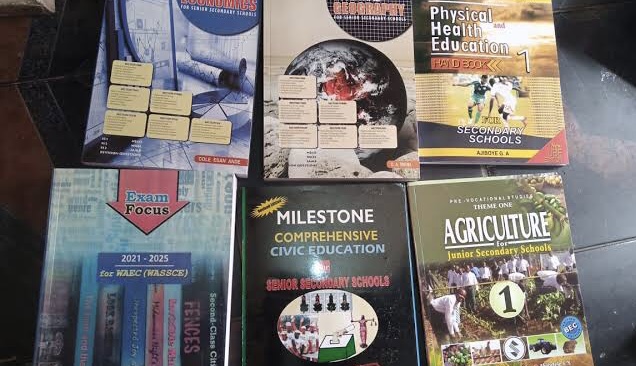By The9jaTREND
As schools resume first academic session this September from the long vacation, parents in Imo, Edo, Benue, Anambra and Ondo states have reason to feel relieved. This benefit comes with the new ban on the use of non-transferable textbooks.
This policy allows used schoolbooks to be passed down to younger siblings or other students, reversing a practice that had previously forced parents to buy new textbooks every academic session.
The aim is to make textbooks reusable, especially for younger siblings progressing to higher classes. This shift is expected to ease financial pressure on households and promote sustainability in education.
Nigerian families continue to struggle with the economic downturn, especially in meeting their children’s educational needs. While no parent wants their child to fall behind academically, the soaring cost of textbooks, sometimes nearly as high as school fees, has made this difficult.
In many cases, policies blocking the use of books from older siblings have added to this financial stress. Some students attend classes without textbooks or are forced to drop out temporarily until their parents can afford the newly mandated editions.
For many Nigerians who attended school in the 1980s, ’90s, and early 2000s, wrapping textbook covers to preserve them for younger siblings was a cherished tradition. There was a shared sense of responsibility and continuity in passing books from one child to the next.
Unfortunately, this practice began to fade when school owners and publishers started designing textbooks that required students to write directly in them, effectively making the books unusable for subsequent students.
Recently, schools have also switched publishers frequently, ensuring that previously used textbooks become obsolete, even if the content remains largely unchanged. This has placed an undue financial burden on parents, especially those with multiple children in the same school.
Previously, publishers supplemented textbooks with workbooks and activity sheets for students to write on, leaving the main textbooks intact for reuse. Today, the merging of workbooks with textbooks has eliminated that option.
This issue highlights the role of publishers. Many have capitalised on the demand for new textbooks each year, especially at the start of a new session, partnering directly with schools to guarantee annual profits.
Some school owners prohibit parents from purchasing textbooks from outside vendors, even when they are cheaper.
They control the market by withholding textbook lists until resumption and insisting that only books bought from the school’s designated shop are acceptable.
Even more concerning is the widespread use of textbooks not approved by the Nigerian Educational Research and Development Council, which regulates educational materials.
This undermines national educational standards and creates confusion for learners switching between unstandardised books.
The Nigerian Educational Research and Development Council (NERDC) must ensure publishers produce creative, innovative, and tech-integrated materials aligned with national goals.
Publishers worried about reduced revenue from reusable textbooks can explore alternative revenue streams, such as developing novel educational content, building educational apps, and expanding digital offerings to schools and learners.
The ban on non-transferable textbooks in these four states is a welcome development that should be replicated nationwide.
By doing so, Nigeria can return to a more equitable and financially inclusive education system where no child is left behind simply because their parents cannot afford new books.
(Punch)
